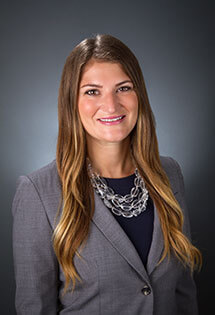

Young Adult Checklist
Cole Hansen, Wealth Management Associate Advisor | Kelli Ruby, CFP®, Wealth Management Advisor | April 11, 2018
Congratulations! You’ve completed your undergraduate or graduate courses and are now moving on to the next phase in your life. Working and living on your own is exciting, with fresh opportunities and challenges, including taking responsibility for bills or loans and beginning the savings process for major purchases (car, home, or trips) and retirement. While this may seem overwhelming at first, having a Dialogue for Impact now to solidify your present financial standing will exponentially benefit you in the long run. We’ve developed a check-list for young professionals to reference when beginning their careers to Prioritize for Progress by strengthening their current situation, and simultaneously planning for their futures.
Savings & Expenses
The first question each graduate should ask is what cushion do I have in the case of a job loss, devastating injury, or unexpected life event. An emergency fund is critical to ensuring that, in a worst-case scenario, you aren’t stressed for cash. The balance of this account should typically reflect 3 months to 6 months of living expenses or the time it would take to find new employment.
An important piece of establishing a savings routine is understanding what current expenses total and what your overall financial picture looks like. A neat tool to use is Mint – a website that tracks all transactions for debit & credit cards and aggregates daily balances. Graphs and charts detail how much is spent in each category so users can determine if they are overbudget for restaurant spending or if they have the financial stability for upcoming vacations, philanthropy, or concert tickets. Checking Mint on a regular basis will also alert you to any discrepancies in your inventory of digital assets that may be related to fraudulent activity and increases the protection of your personal identifiable information (PII). An online password manager like Keeper is also useful for safeguarding online log-ins.
Once the emergency account has been appropriately funded with monthly income and expenses in mind, another great way to save is through the deferral of your paycheck into an employer-sponsored retirement plan, the most common being a 401(k). More details below:
401k
The 401(k) is a retirement plan that you contribute to with income from your paycheck on a pre-tax basis. Some employers offer matching contributions, usually up to 3% or 4% of what you defer. It would behoove employees to take advantage of this extra compensation that is essentially free money by contributing at least the matching rate.
A key component of 401ks and other retirement pans is the tax-deferred nature and inherent compounding interest. Compound interest is the idea that because capital gains and dividends are not taxed on an annual basis, they are able to be re-invested at a higher rate than if the gain or income was taxed. This is very beneficial for young investors with a long time-horizon to retirement. The chart below and the Khan Academy video explain compounding interest in greater detail. Another retirement account available to investors is the Roth IRA, explained more in the next section:

Chart: https://investor.vanguard.com/retirement/savings/when-to-start
Roth IRA
The Roth IRA is a tax-exempt retirement account, meaning that because the dollars you contributed have already been taxed, and will not be taxed again. Once you reach a certain age specified by the IRS, currently 59 ½, all funds in the account can be withdrawn without penalty. If an investor will be in a higher tax bracket later in life, then contributing to this account each year is very advantageous due to compounding interest and tax savings. The IRS specifies that qualified withdrawals for a first-time home purchase and certain medical/educational expenses and are not penalized if distributed from the account before 59 ½.
As of this writing the maximum contribution to the account is the lessor of earned income or $5,500. Investors should only make contributions to retirement accounts after accounting for all other bills as poor credit can negatively affect future purchases, which is addressed below:
Building Credit & Paying Off Debt
Anyone that has applied for a rental, car lease, or credit card knows that adequate credit is a critical piece of securing a satisfactory transaction. Poor credit can either cause the disqualification of a rental application, as most landlords will not rent to individuals with poor credit, or force home buyers to take on loans with excessively high interest rates. Effective steps to build credit are:
- Paying 100% of your bills on time, including utilities.
- Keeping lines of credit open, but with manageable balances (usually less than 30% of max credit)
- Always making the minimum payment on credit card bills on time to minimize interest charges.
- Monitoring your credit report for any irregularities.
- Organize student loans by interest rate and payoff the highest interest rates first. Refinancing student loans may also be an option
For those with minimal credit history, signing up for a credit card is a good start to build a credit profile. While access to credit may create budgeting risks, maintaining a consistent strategy for purchases and balance reduction is key to building your profile effectively. Your first credit card will most likely be with your current banking relationship, but subsequent cards may offer perks such as airline points, cash rewards, or retail partnerships.Nerd Wallet’s 2018 list of top credit cards is a great place to begin the search for a card outside of your normal bank to take advantage of category-specific cards like no annual fee, airline miles, and relationship rewards.
You can access your credit report free of charge annually at any of these sites:
Estate Planning
Young professionals may think that estate planning is reserved for high-net worth individuals or older generations, but every adult with meaningful assets should maintain some sort of documentation to describe how belongings will be distributed upon death.Trusted advisers can be leveraged to ensure the appropriate documents are drafted and then updated to reflect life changes. Declaring the recipients of your assets in a will or trust and electing beneficiaries for retirement accounts is a great start.
- A will is a broad document that directs the disbursement of your assets to friends, family, or charities at your death There are some brief requirements to validate the will at time of its writing: the individual must not be under duress, be of sound mind, and had two witnesses present.
- Naming beneficiaries to retirement accounts is another key estate planning tip to ensure assets are directed to the appropriate person or entity. Primary and contingent beneficiaries can often be named on accounts to provide some layering.
Young adulthood is not a cake-walk by any means, but by ensuring critical financial matters are addressed now, you allow yourself greater financial flexibility in future decisions. The Ripple Effect of establishing a solid financial base now will allow you to shift your attention to more enjoyable aspects later in life.
** The information provided should not be interpreted as a recommendation, no aspects of your individual financial situation were considered. Always consult a financial professional before implementing any strategies derived from the information above.




